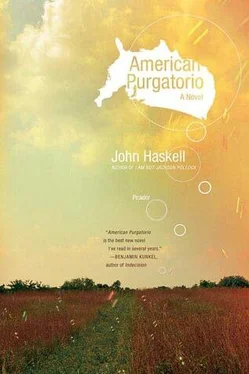John Haskell - American Purgatorio
Здесь есть возможность читать онлайн «John Haskell - American Purgatorio» весь текст электронной книги совершенно бесплатно (целиком полную версию без сокращений). В некоторых случаях можно слушать аудио, скачать через торрент в формате fb2 и присутствует краткое содержание. Год выпуска: 2006, Издательство: Picador, Жанр: Современная проза, на английском языке. Описание произведения, (предисловие) а так же отзывы посетителей доступны на портале библиотеки ЛибКат.
- Название:American Purgatorio
- Автор:
- Издательство:Picador
- Жанр:
- Год:2006
- ISBN:нет данных
- Рейтинг книги:3 / 5. Голосов: 1
-
Избранное:Добавить в избранное
- Отзывы:
-
Ваша оценка:
- 60
- 1
- 2
- 3
- 4
- 5
American Purgatorio: краткое содержание, описание и аннотация
Предлагаем к чтению аннотацию, описание, краткое содержание или предисловие (зависит от того, что написал сам автор книги «American Purgatorio»). Если вы не нашли необходимую информацию о книге — напишите в комментариях, мы постараемся отыскать её.
Los Angeles Times
American Purgatorio — читать онлайн бесплатно полную книгу (весь текст) целиком
Ниже представлен текст книги, разбитый по страницам. Система сохранения места последней прочитанной страницы, позволяет с удобством читать онлайн бесплатно книгу «American Purgatorio», без необходимости каждый раз заново искать на чём Вы остановились. Поставьте закладку, и сможете в любой момент перейти на страницу, на которой закончили чтение.
Интервал:
Закладка:
John Haskell
American Purgatorio
For my parents
I. ( Superbia )
1
I’m from Chicago originally. I went to New York, married a girl named Anne, and was in the middle of living happily ever after when something happened. I didn’t know what it was, and if you would have asked me at the time I would have said nothing, that nothing was happening, because for me nothing was. I was standing in a convenience store next to a gas station along a picturesque parkway in New Jersey. I was perusing the assorted candies and snacks, debating with myself what to bring back to Anne. She was waiting in the car. We were driving to her mother’s house and I was probably reading the labels, looking for something nutritious to eat. Although it wasn’t a dream, the unnatural light of the convenience store made it seem as if I was existing in the world of a dream, the main difference being that, unlike a dreamworld, in this world, the convenience store world, nothing much was happening.
That’s not right. It was all happening, I just wasn’t seeing it. I wasn’t seeing it because my attention was absorbed by walls of refrigerated cases and the aisles of bright displays. I was concentrating on all the possible choices, which, after a while, I’d narrowed down to a thin pack of peanuts, a protein-style candy bar, and a so-called energy drink. When I paid the cashier I didn’t notice the rings on the woman’s fingers, and I didn’t count my change. When I walked to the door I didn’t notice the grease stains on the square brown tiles or the sky which was blue through the window. When I walked outside, back to the car, all I noticed was that the car was gone.
* * *
This is a story of a man who … I won’t say I was never stuck, but I was good at making adjustments. That was my specialty, adjusting to circumstances — I prided myself on this ability — and so the first thing I did was convince myself that nothing had happened, that Anne would suddenly appear. And when she didn’t appear I began looking for her. She had to be somewhere, in some part of this service station area, and because there were only a limited number of places she could be, I kept looking in those places. I expected to see her, either waiting for gas or putting air in the tires or parked in the lot behind the small store. Although I didn’t actually see her in any of the places she ought to be, I knew she was there in one of them, and that in my mind I was making a mistake, that fatigue or oversight or an optical illusion was keeping me from seeing what must be right in front of me.
According to our plan Anne would be filling the car with gas and I would be buying some treats for the road, for our journey to Nyack, north of New York City. New York City was where we lived, in a house in Brooklyn, and we were driving to Anne’s mother’s house, and now she was parking the car, or had parked it, and was waiting for me in the parking area behind the store. But she wasn’t there. The service station compound was not that big, and as I walked the length of it and took an inventory of every car, I could see that our car, our little maroon station wagon, wasn’t getting gas and it wasn’t getting air and it wasn’t waiting in the parking area.
Something was happening. I wanted nothing to be happening. I wanted not to be nervous and worried, and although I was worried, I tried to keep that worry safely below consciousness. Which wasn’t easy. To keep it there I had to assume certain things. I had to assume that Anne was having trouble with the car and had needed to keep the engine running, that she’d gone ahead and would soon be returning. Although this didn’t make much sense, I was willing to believe it. I was eager, in fact, to believe it, because if it wasn’t that, then it was some alternative, and I didn’t want to think too hard about any alternative because I wanted her back. I wanted the car to be where it ought to be and I’d just overlooked it. There it is, I wanted to say. No problem, I wanted to say, but it wasn’t the case. The car was gone and so was Anne.
I could tell I was upset because my heart was pounding against my chest; for me, that’s always an indication. Also, there was the fact that I was cursing her, cursing, and at the same time praying for her safety. She wouldn’t just leave me like that or forget me. That would be impossible. And yet if I let myself think about what might have happened … But I didn’t do that. I should say, I didn’t want to do that, because how could I not? How could I not imagine that some man with a gun or a knife had approached her and forced himself into the car, forced her to drive to some remote area off the road, some trees and a picnic table, and to lie on the picnic table, and she was wearing jeans, I could picture them, and her running shoes, and so the pounding of my heart was fear. I loved her and I was afraid. And yet at the same time if she was taking a little side trip to buy some … whatever, some film or some … sushi or something and she’s, not raped, but safe and happy — although I wanted her to be safe and happy — I would be angry and was going to be angry, but at the moment I was confused, partly because I loved her and partly because I didn’t want to feel the thing I was feeling.
Since I’d left my cell phone in the car I used a pay phone by the air supply to call, first her cell phone and then mine, but either they weren’t turned on or they weren’t working. So I waited. I sat on the perimeter of the gas station, literally on the edge of a galvanized metal railing, watching the procession of cars pulling up to the attendants in blue uniforms. There was never really a lull in the stream of cars, but during a relative lull I walked to one of the attendants and asked the man if he’d seen a maroon-colored station wagon, or a dark red station wagon, but the man, naturally, couldn’t remember any one specific car. And not only that, he didn’t speak much English. But he wanted to be helpful, so he called over a colleague who, although he seemed more in charge, had even less facility with the English language, which was my language. And because I thought I knew a little Spanish I tried to speak, about un carro con una señorita. Buscando por la señorita, I said, and the second man, who according to his shirt was named Ramon, after consulting with the other attendants, and after some gesturing — all the time monitoring the gas pumps — made it clear that something bad had happened. Something muy malo. And although I didn’t want to hear about anything muy malo, I said, Qué pasa, which means, roughly, “What is happening,” not because I couldn’t feel what was happening to me, but because it was the only way I knew to ask what had happened, to my wife.
Something had happened, that much I could translate. I couldn’t be sure what it was, or how it happened, or who it had happened to, only that it seemed to involve several people and a couple of cars. I believed the men were probably telling the truth, but it wasn’t my truth, and certainly not a truth about Anne. They were describing some other situation. There were millions of women in the world, and as the attendants were indicating the height of this specific señorita, and saying that moreno (which means brown) was the color of her hair, it was clear they were saying that this woman was gone. Nada más. Which means no more, but no more of what? I didn’t know. I was saying to them, and to myself, No problema, no problema, but the men were shaking their heads as if there was a problema, a gran problema, and I was backing away, thanking them and nodding, trusting that the whole communication process was impeded by the excitement of the retelling, or by the impatient honking of the cars waiting for gas, or by the language barrier; somehow in the gap between us the message had been scrambled, and I was getting the whole thing wrong.
Читать дальшеИнтервал:
Закладка:
Похожие книги на «American Purgatorio»
Представляем Вашему вниманию похожие книги на «American Purgatorio» списком для выбора. Мы отобрали схожую по названию и смыслу литературу в надежде предоставить читателям больше вариантов отыскать новые, интересные, ещё непрочитанные произведения.
Обсуждение, отзывы о книге «American Purgatorio» и просто собственные мнения читателей. Оставьте ваши комментарии, напишите, что Вы думаете о произведении, его смысле или главных героях. Укажите что конкретно понравилось, а что нет, и почему Вы так считаете.











